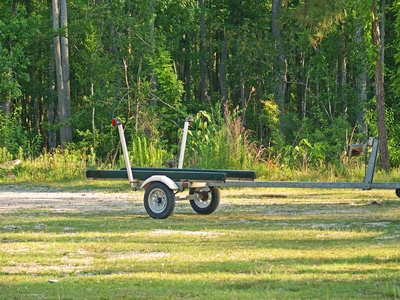
With all the selection and technology available on today's tire market, you might wonder why a specialized trailer tire should even be necessary. The fact that trailers (which simply get towed around as dead weight) even need a specialized tire seems counterintuitive; a 5,000 pound trailer shouldn't need any more support than a 5,000 pound car, especially considering the fact that it doesn't have to turn or accelerate. However, trailer tires are constructed the way they are for a very specific reason.
Cars and trailers have two very different requirements. Car tires are engineered to provide traction in the forward-and-back (longitudinal) and side-to-side (lateral) directions whiles providing a comfortable ride. Trailer tires are engineered to support the weight of the trailer for many thousands of miles while not bouncing the trailer off the road, and that's about it.
One of the major ways in which trailer tires differ from car tires is that they have very stiff sidewalls. Those very thick sidewalls are designed to help support the trailer weight without flexing, but that lack of flexibility carries with it some inherent drawbacks. Car tires' sidewalls flex to allow more of the tire's tread to stay in contact with the road; a boon to performance but a liability where durability is concerned.
Trailer tires are more durable than car tires for two reasons. The first is the aforementioned sidewall thickness, the second is the trailer tire's rubber compound. All rolling objects have a certain amount of "rolling resistance," which is the tire's tendency to stick to the road. While stickiness is good for performance and traction, it reduces fuel mileage and increases tire temperature while moving. Trailer tires have very hard rubber compounds, which helps to reduce rolling resistance but absolutely kills traction. One extreme example of low rolling resistance wheels are solid metal train wheels, which are very efficient at allowing the train to move but do little to grip the track.
Almost all car tires are "radially" designed, meaning that their interior belts are set at 90-degree angles to each other so that some are always pointed in the direction of travel. While you can buy radial trailer tires, many are the less sophisticated bias-ply type, which use belts set at 45-degree angles. Bias-ply tires are a bit more rugged and damage resistant than radials, but radials offer a better ride, better fuel economy, longer life, better traction and better trailer tracking.
You can use light truck tires on a fairly lightweight trailer, but you'll want to subtract at least 10 percent of the tire's rated load capacity to account for sidewall flex. Passenger car tires flex even more, so you may need to subtract as much as 40 percent load capacity for safe running. You should never, ever, ever use trailer tires on a car. You might get a little better fuel mileage, but that will come to a quick end when you go flying off the road or get T-boned while sliding through an intersection.